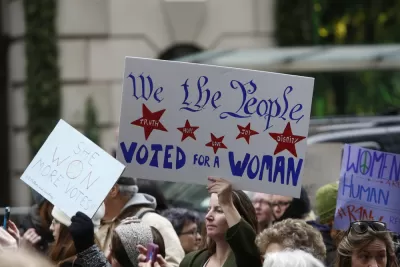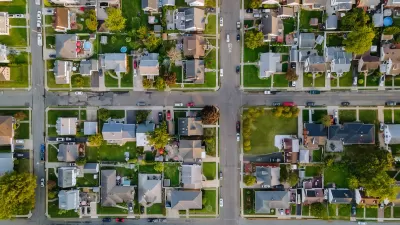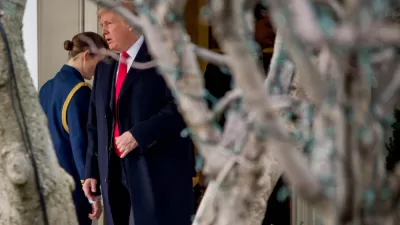No Electoral College needed: these were the most popular Planetizen posts from the year 2016.

To introduce the most popular posts of 2015, I wrote the following paragraph, anticipating, but still underestimating, the rare position we would find ourselves in at the end of 2016.
By this time next year, the United States will have a new president-elect, and much of the country will be deeply preoccupied with thoughts about the future. Last year at this time, the country was embroiled in strife with long roots in histories of poverty and racism. It was impossible to avoid the consequences of the past. Of course, similar points could be made about any number of years, since time immemorial.
Nostalgia is one of the most popular terms getting thrown around at the end of 2016 to describe the current political and cultural era, but that's not what I'm going for here. There are, undeniably, many people excited about the prospect of returning to some previous version of the world, as the machinations of Brexit, President-elect Trump, or the looming election in France show. There are also many people who think nostalgia doesn't explain a world rushing so quickly away from the exuberance that ushered in the Obama Administration.
I don't share those words from 2015 in a desire to erase 2016, but rather from a desire to prepare us all for 2017.
Planners can't avoid the consequences of geo-politics—in fact, the fingerprints of the profession can be found all over the country's current political and economic environment. There will be opportunities in 2017 (and 2018 and 2019 and 2020) for communities to decide whether planning should be an instrument for overturning the status quo or for preserving it. Hopefully planners will succeed in establishing a middle ground on that spectrum. Hopefully planners can lead in the hard work of crafting compromises that has proven too difficult for the political parties running the country, and will likely remain so for the foreseeable future.
Donald Trump's name is found infrequently in the lists that follow, which might come as a welcome respite from the mainstream news stories that dominated 2016. Yes, the news cycle of land use and planning differs greatly from the news cycle of presidential politics, but we don't suggest the stories in this list to facilitate even the slightest hint of nihilistic escapism from 2016. There were a great many stories, ideas, and places that required our attention in 2016. We must consider and reconsider them, deeply and carefully, before we decide what to do with 2017.
Most Popular News Posts
1) Urban Planning Ranked as the Second Best Job in Canada
2) Trump Would Move Infamous Sign From Chicago to the White House If Elected [April Fools Edition]
3) 'Rust Belt Chic' Not Enough to Attract Millennials in Some Cities
4) 65-Year-Old Disney Cartoon Perfectly Explains the Craziness of Driving a Car
5) PBS Takes on Urban Planning, Good and Bad, with '10 Towns' Special
6) How Tesla Is Killing California's Electric Car Market
7) Canada Is Looking Better and Better
8) How McMansions Fail Basic Architectural Concepts
9) Why So Big? Rethinking Fire Truck Design
10) Where Have All the Great Urban Places Gone?
Most Popular Blog Posts
1) The Best Planning Apps for 2016
2) Retail Parking: A View from Google Earth
3) The Changing Nature of Retail: The Impact of Online Shopping on Cities
4) The Los Angeles Mystery
5) What I Learned When an Angry Group Destroyed My Public Meeting
6) Are Garden Cities Sustainable?
7) Simulating the City
8) The 3 Most Common Community Engagement Mistakes
9) Does Urban Planning Require Passion?
10) An Accurate Answer to an Interesting Question: Are Compact Neighborhoods Really Most Affordable?
Most Popular Feature Articles
1) Top 10 Websites - 2015
2) Top Books - 2016
3) What Millennials Want, and Why it Doesn't Matter
4) Has Portland Lost its Way?
5) Teaching Urban Planning to Pre-Schoolers
6) Top Websites - 2016
7) Twisting the Truth: The NIMBY Opposition to Second Units in L.A.
8) How One Developer Is Delivering Urban Infill
9) Theme Park Urbanism
10) A Back-to-School Reading List of Books About Cities

Trump Administration Could Effectively End Housing Voucher Program
Federal officials are eyeing major cuts to the Section 8 program that helps millions of low-income households pay rent.

Planetizen Federal Action Tracker
A weekly monitor of how Trump’s orders and actions are impacting planners and planning in America.

Ken Jennings Launches Transit Web Series
The Jeopardy champ wants you to ride public transit.

Opinion: Transit Agencies Must View Service Cuts as Last Resort
Reducing service could cripple transit systems by pushing more riders to consider car ownership, making future recovery even less certain.

‘Smart Surfaces’ Policy Guide Offers Advice for Building and Maintaining Urban Tree Canopies
Healthy, robust tree canopies can reduce the impacts of extreme heat and improve air quality.

New Jersey Lawsuit Targets Rent-Setting Algorithms
The state of New Jersey is taking legal action against landlords and companies that engage in what the state’s Attorney General alleges is illegal rent fixing.
Urban Design for Planners 1: Software Tools
This six-course series explores essential urban design concepts using open source software and equips planners with the tools they need to participate fully in the urban design process.
Planning for Universal Design
Learn the tools for implementing Universal Design in planning regulations.
Heyer Gruel & Associates PA
Ada County Highway District
Institute for Housing and Urban Development Studies (IHS)
City of Grandview
Harvard GSD Executive Education
Toledo-Lucas County Plan Commissions
Salt Lake City
NYU Wagner Graduate School of Public Service





























